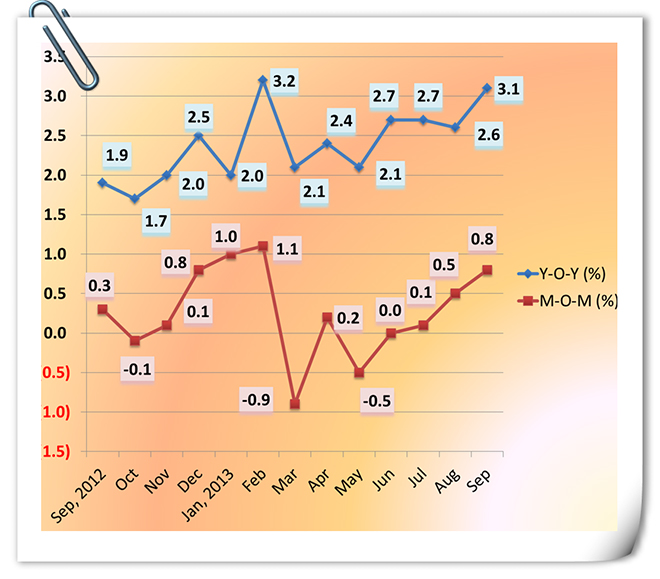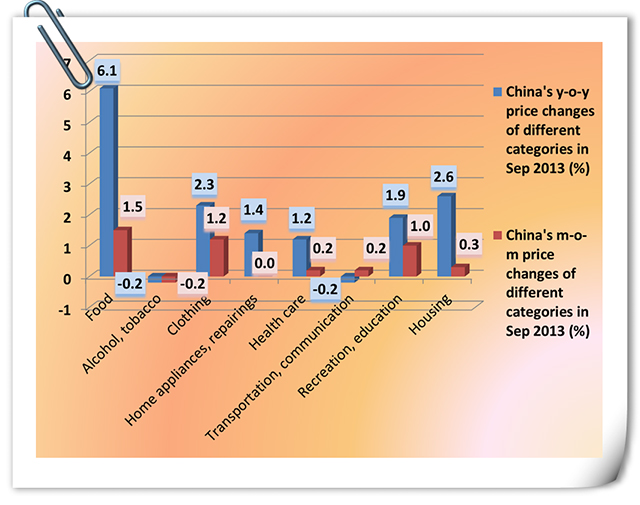HOME >>
China’s CPI rebounds to hit seven-month high
Source:Globaltimes.cn Published: 2013-10-15 17:04:00
| Editor's Note |
China's consumer inflation accelerated to a seven-month high of 3.1 percent in September, official data showed on October 14, but the stronger-than-expected reading is not expected to challenge policymakers with strong commitments to restructuring reforms, economists said.
The consumer price index (CPI), the main gauge of inflation, rose to 3.1 percent year-on-year in September from 2.6 percent in August, the National Bureau of Statistics (NBS) said on October 14, This beat previous market estimations of roughly 2.9 percent.
| Lates News |
China's Sep inflation rebounds to 3.1 pct
China's consumer price index (CPI), a main gauge of inflation, rose 3.1 percent year on year in September, up from 2.6 percent in August, the National Bureau of Statistics (NBS) said on October 14.
CPI hits seven-month high
Even though September saw higher inflation, right after the announcement of a surprise slide in export growth for the month, general market sentiments remain calm.
China's Sep PPI drops 1.3 pct
China's producer price index (PPI) fell 1.3 percent in September from a year earlier, compared with a 1.6-percent drop in August, the National Bureau of Statistics (NBS) said on October 14.
| Charts |
China's y-o-y/m-o-m CPI readings in the past year

China's y-o-y/m-o-m price changes of different categories in Sep 2013

In September, food prices rose 6.1 percent year on year, while prices of non-food products, including clothing, home appliances and daily necessities, moved up 1.6 percent, according to the NBS.
Source: NBS Graphics: Globaltimes.cn
| Comments |
 Reasons behind the CPI uptick:
Reasons behind the CPI uptick:Yu Qiumei, a senior statistician with the NBS said in a statement posted on the bureau's website on October 14:
Food inflation recorded a 1.5 percent gain from August to September, pushed up by the Mid-Autumn Festival and National Day holidays, and droughts and floods in some areas.
Zhao Xijun, deputy director of the School of Finance, Renmin University of China, told Xinhuanet.com
The increasing cost brought by ongoing industrialization projects has contributed much to the rising CPI this month. According to the NBS, rising prices among companies can be attributed to a widespread increase of investment in human resources, food safety, technology and organic production.
Lu Ting, chief China economist at Bank of America Merrill Lynch in Hong Kong, told the Global Times on October 14:
A low base effect of last year would be the main factor driving up the CPI readings in months to come.
 Inflationary pressure in future:
Inflationary pressure in future:Zhang Zhiwei, chief china economist at Nomura, told the Xinhua News Agency
Zhang forecast CPI inflation will rise further in the fourth quarter and noted rising risks that it may rise above 3.5 percent for some months in 2014.
 CPI rises on the government's policymaking:
CPI rises on the government's policymaking:Economists generally exclude the possibility of any changes in the government's policy stance, although the CPI reading has risen above the one-year benchmark deposit rate of 3 percent set by the central bank.
Lu Ting, chief China economist at Bank of America Merrill Lynch in Hong Kong, said:
With the economic growth expected to be steadied above 7.5 percent for the whole year, the announcement of continued pro-growth measures is less likely. CPI rises, hardly dramatic, would not be sufficient for the government to turn to further tightened policies in order to rein in risks.
Zhang Lei, a Beijing-based macroeconomic analyst with Minsheng Securities, told the Global Times:
This won't be a concern for the government, as the overall price level is unlikely to be out of control. The focus of monetary policy-setting has already been steered toward bolstering economic reforms aimed at rebalancing the economy.
Liu Ligang, chief Greater China economist at ANZ Banking Group, told Xinhua:
The central bank will not change the current "slightly tightening" monetary policy over the inflationary pressure, as Premier Li Keqiang has on many occasions stressed China will maintain its monetary policy and expressed confidence in meeting the annual growth targets.
It is inaccurate to comment on prices simply by analyzing CPI readings. As long as the CPI is a positive number, prices will rise. Even a small increment of growth will affect consumers, as increase of income lags behind. Policymakers should consider absolute prices, or prices of goods or services in terms of currency, rather than CPI alone.
Source: hexun.com
| Related Biz Reports |
 |
 |
 |
 |
 |
 |
| News Vocab |
通货膨胀 tōnghuò péngzhàng
“通货” n. currency; current money(Source: 《新世纪汉英大词典》)
“膨胀” v. inflate; swell(Source: 《新世纪汉英大词典》)
“通货膨胀” n. inflation(Source: 《新世纪汉英大词典》)
Example:
昨日,国家统计局公布,9月份全国居民消费价格总水平同比上涨3.1%,再次上破3%的温和通货膨胀警戒线。(Source: 金融界网)
According to the National Bureau of Statistics yesterday, the consumer price index (CPI) increased by 3.1% year-on-year in September, breaking the red line of 3% moderate inflation.
Web editor: jinjianyu@globaltimes.com.cn
Posted in: